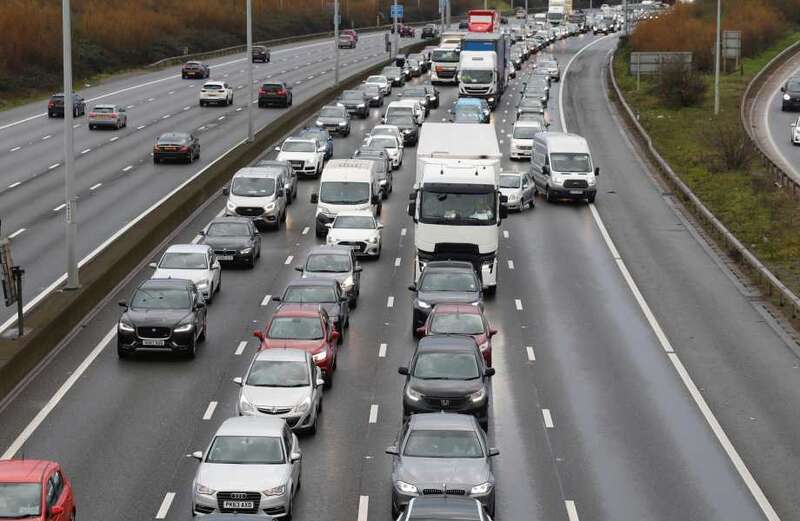MOTORISTS have been warned about eight new driving charges set to hit in 2023 - here's what you need to know.
This year there will be several new motor charges and rules implemented on the roads, including Ultra Low Emission Zones, pavement parking and HGV levy tax.

ULEZ and Clean Air Zones
London's Ultra Low Emission Zone will be extending to all 33 London boroughs from August 29, 2023.
The policy is designed to improve air quality and reduce pollution. Those whose car's do not comply with the minimum emission standards can pay £12.50 a day.
Manchester, Tyneside, and Sheffield have all also introduced similar clean air schemes.
 Spectacular New Year fireworks light up London sky as huge crowds celebrate across UK for first time in three years
Spectacular New Year fireworks light up London sky as huge crowds celebrate across UK for first time in three years
They appear to be working, as TfL reported more than four out of five motors now meet the minimum emission levels.
Sheffield is kickstarting a Class C zone on February 27 this month, which will involve buses, coaches, taxis, private hire vehicles, heavy goods vehicles, vans and minibuses.
The charge will be between £10 and £50 per day.
In Glasgow, from June 1, 2023, motorists could be slapped with a £60 fine if they don't comply with the Low Emission Zone.
Exemptions will apply to residents in these zones up until June next year.
Fletchers Associate solicitor and team leader Jayne Orme said: “All diesel cars are allowed to be driven in London, but around 9.5 million of them don’t meet the latest emissions standards.
"These cars will incur a fee if they are driven in these zones so at a time when money is tight it is really important to check before you travel as you don’t want to be caught out with unnecessary fines.
"I do believe something like this needed to be done to try and reduce the effects of climate change, however the timing for such changes is probably not great.”
Transport for London (TfL) Scrappage Scheme
Londoners who receive certain disability and means-tested benefits have been allowed to apply for the car and motorcycle scrappage scheme.
 Robbie Williams poised to launch his own brand of energy drinks to rival Prime
Robbie Williams poised to launch his own brand of energy drinks to rival Prime
The scheme has been in place since January 20, 2023, and offers grant opportunities as well as Annual Bus & Tram passes.
Sole traders, micro-businesses with 10 or fewer employees and charities have also been awarded a separate van and minibus scrappage scheme.
Fuel duty rates
Amid the cost of living crisis, UK fuel duty rates were cut by 5p for one year, but on March 23, 3023 this will stop.
The Office for Budget Responsibility has even said the duty will increase by 12p per litre.
More information is predicted to be discussed during the Spring Budget on March 15.
Pavement parking ban
The pavement parking ban is designed to help protect the safety of pedestrians and keep pathways more accessible.
Scotland was the first country in the UK to ban pavement parking, in 2019 they passed the Transport (Scotland) Bill, with its nationwide ban expected to come into full effect in 2023.
It was delayed in 2021 but is set to be implemented this year.
20mph speed limits cap
Motorists in Wales can expect to see speed limits on most restricted roads cut from 30pmh to 20mph from September 17, 2023.
This move is to try and secure more safety for residential and pedestrian areas.
The country will be one of the first in the world to implement such a cap on roads shared by both pedestrians and cyclists.
Cardiff, Pembrokeshire and Monmouthshire have already seen some roads with this restriction from July 2021 to May 2022.
Number plates
Although it is not strictly a rule change, is it worth being reminded that new licence plates will be rolled out for newly-registered cars this year.
New vehicles will be registered under the "23" number plate from March, while September will see a "73" plate produced.
Benefits in Kind (BiK) tax rates
A Benefits in Kind contribution is also known as a company car tax.
Essentially it's goods and services handed to an employee for free or reduced cost with their salary.
If an employee has a company car, they must pay a BiK contribution.
The model of the car will depend on how much tax has to be paid.
They are categorised into bands, and these costs have been rising - for example a petrol car emitting 100g/km emissions today has to pay 25% BiK, whereas in 2013, it was just 13 per cent.
The Government has stated no rates will increase until April 2025 for electric vehicles in a bid to see more on the road.
Heavy Goods Vehicle (HGV) levy
HGV's that weigh over 12 tonnes have to pay a levy charge to cover the gradual damage they cause to our roads.
But this cost was suspended when the Covid Pandemic hit, and was continued for another year in August 2022.
However, this will come to an end in August this year and see the HGV levy return.
